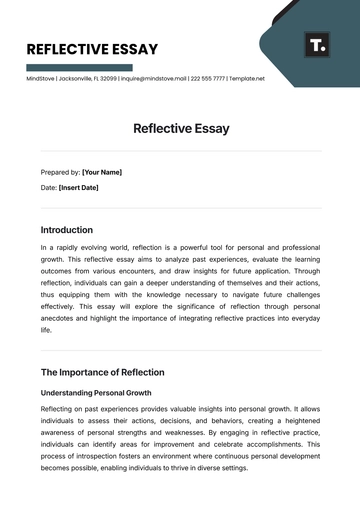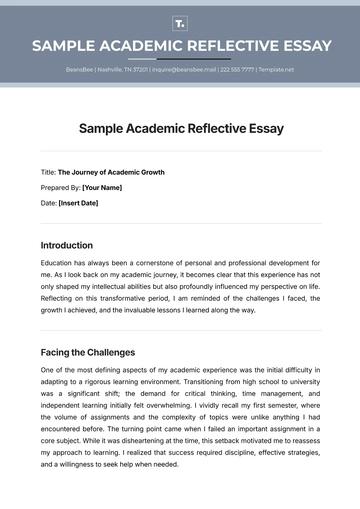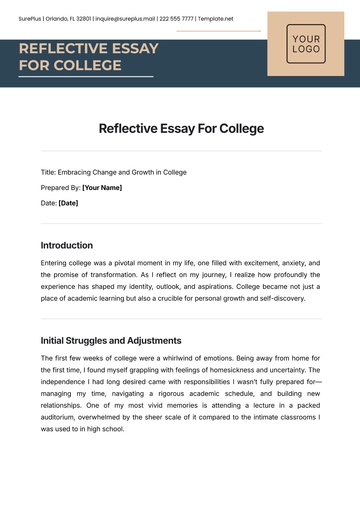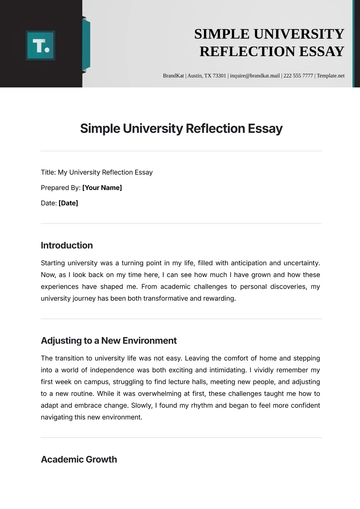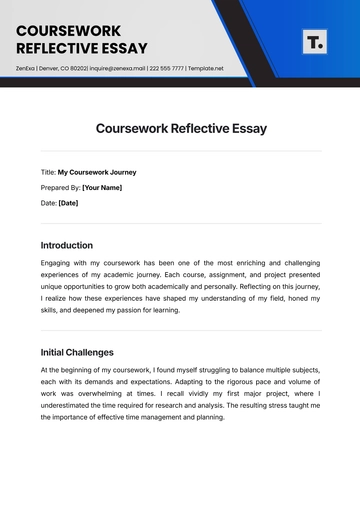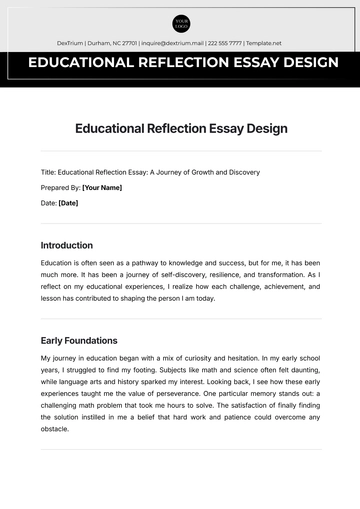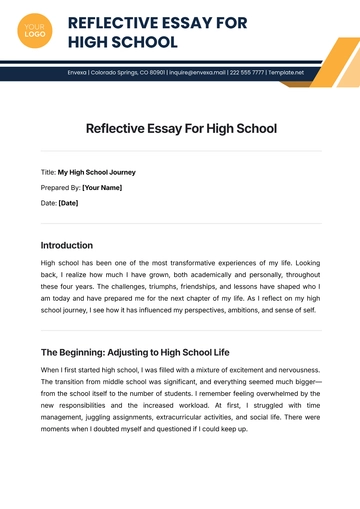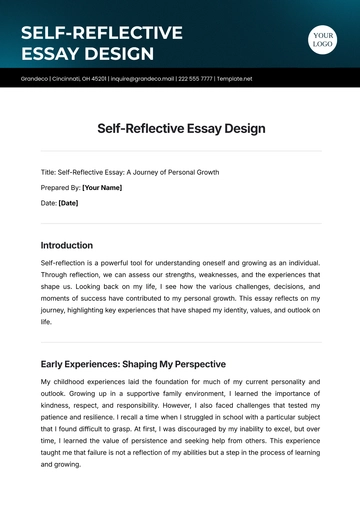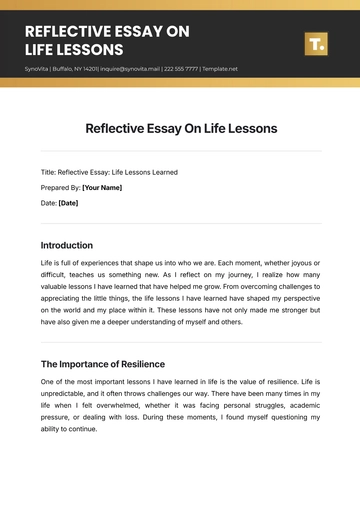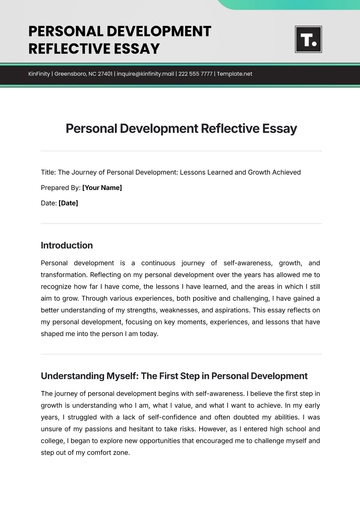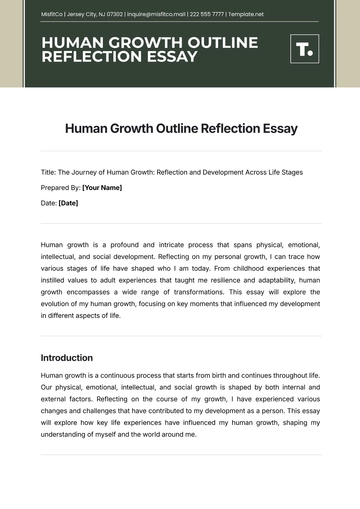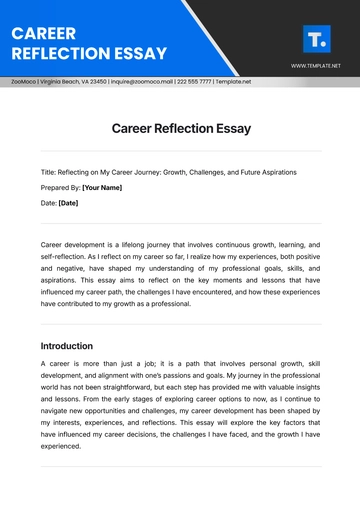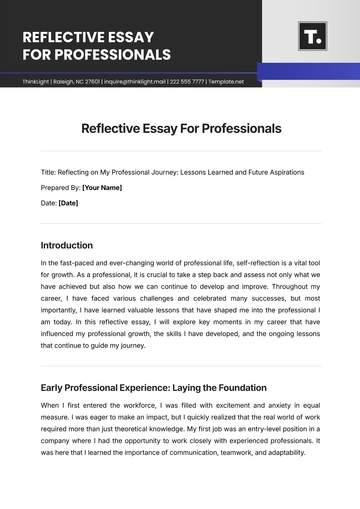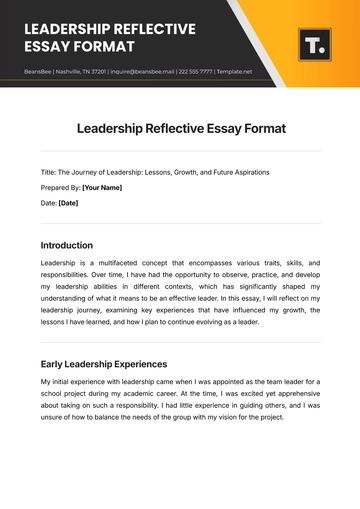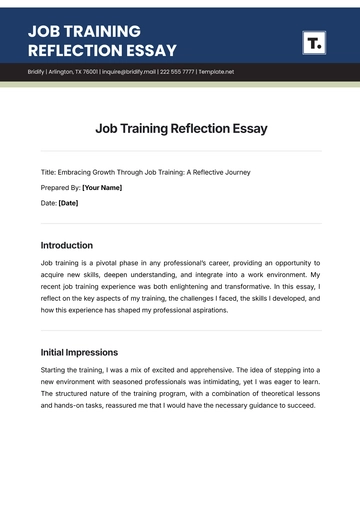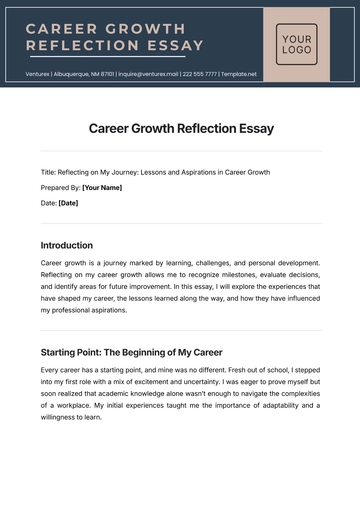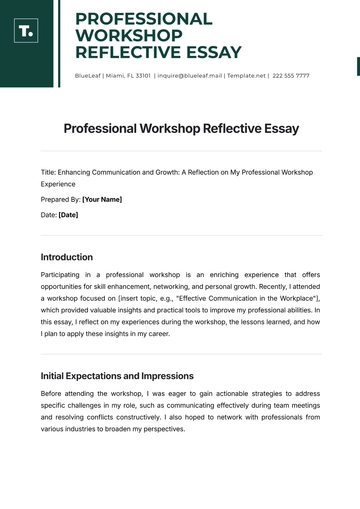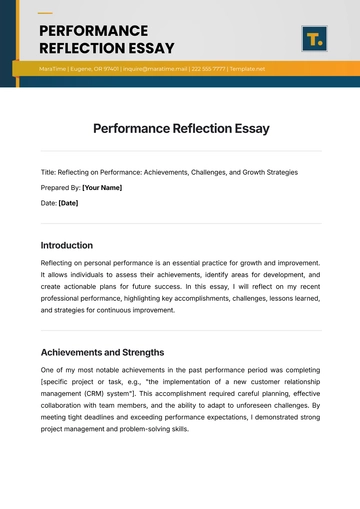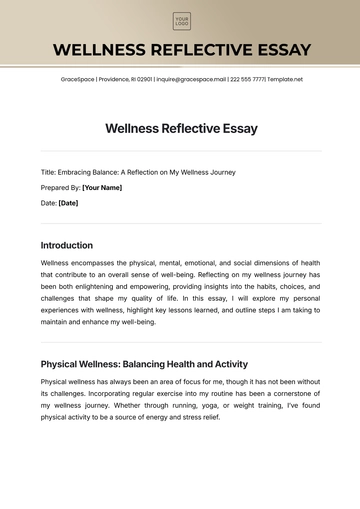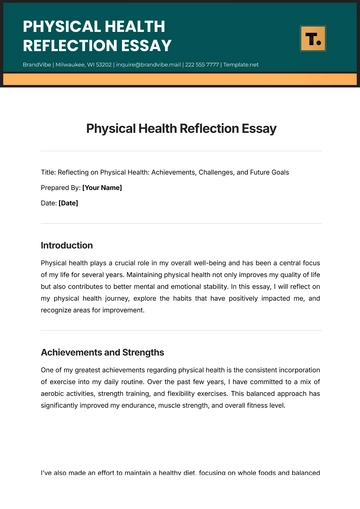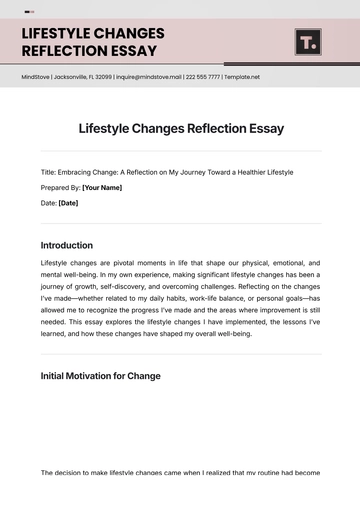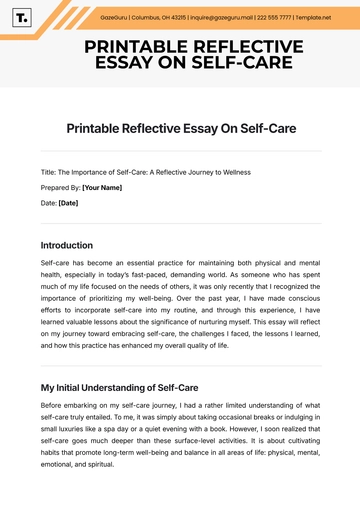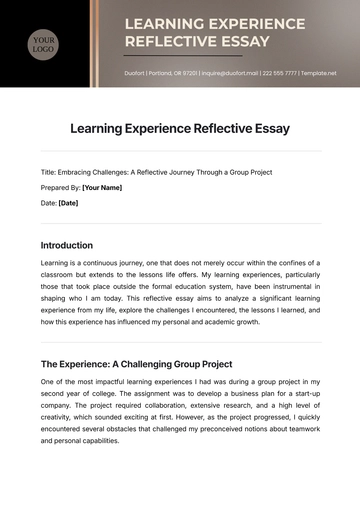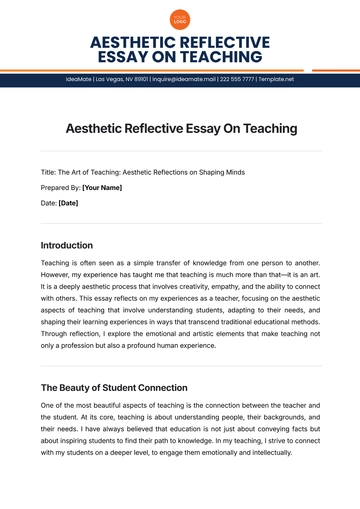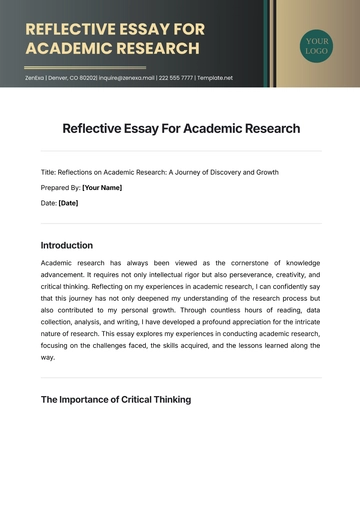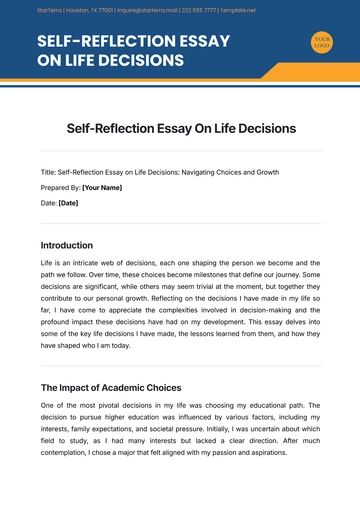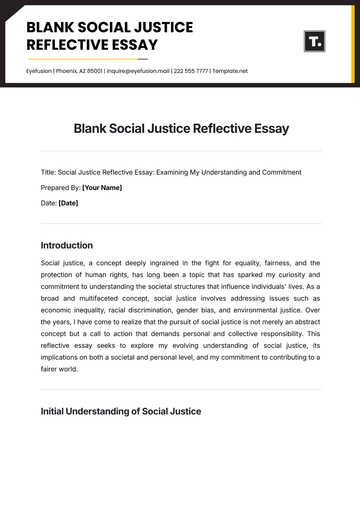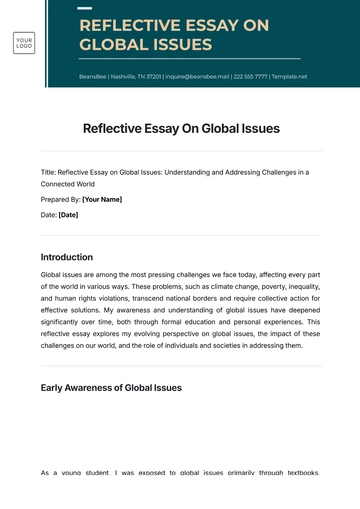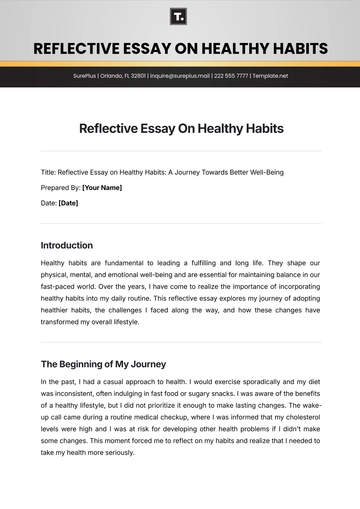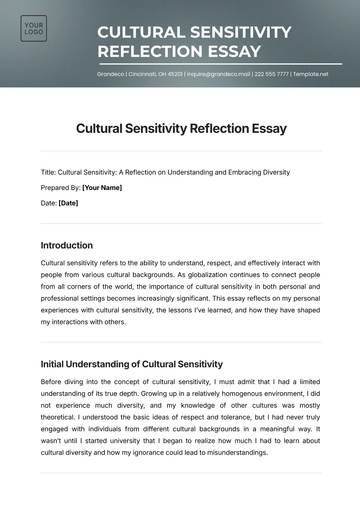Free Human Growth Outline Reflection Essay
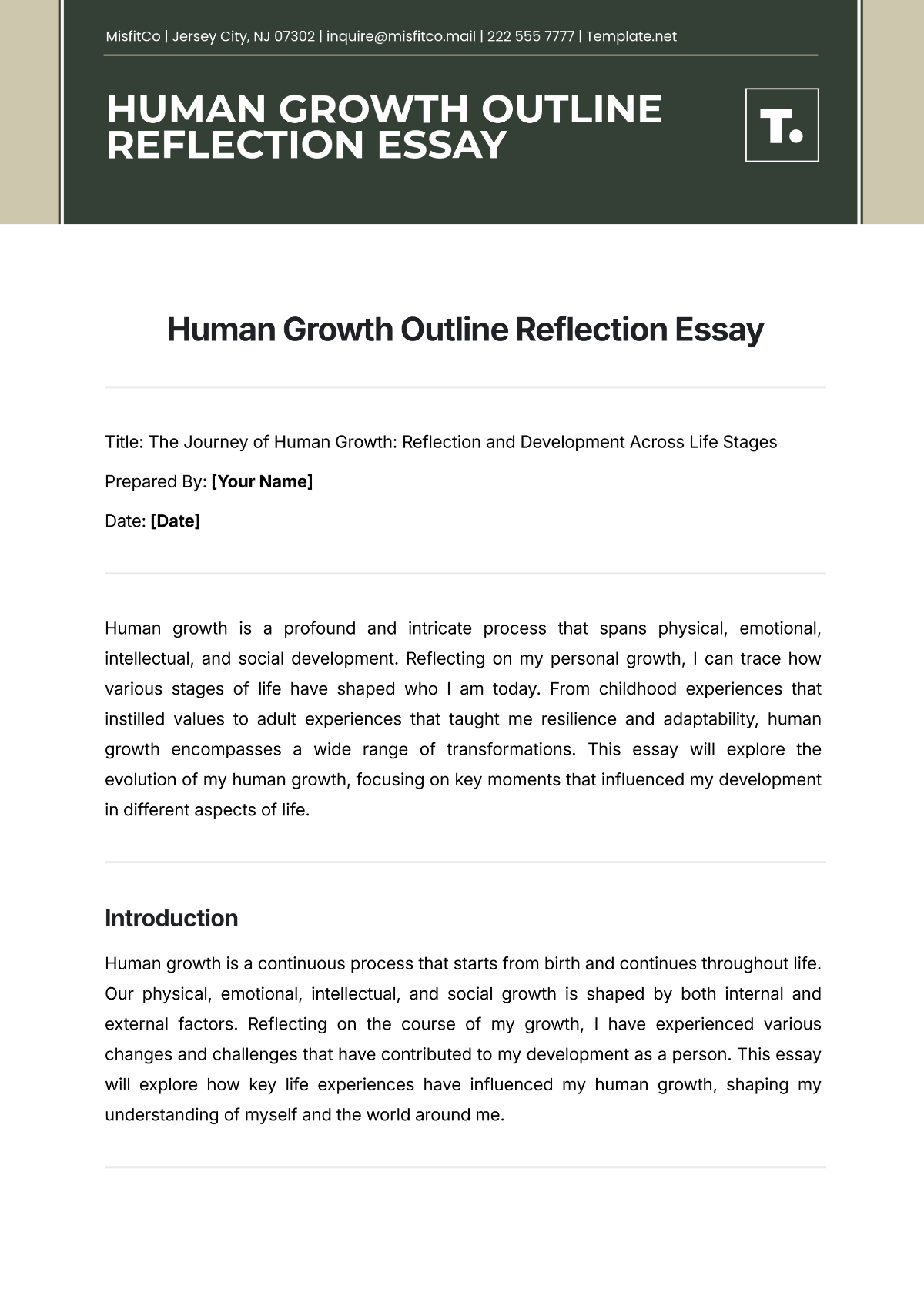
Title: The Journey of Human Growth: Reflection and Development Across Life Stages
Prepared By: [Your Name]
Date: [Date]
Human growth is a profound and intricate process that spans physical, emotional, intellectual, and social development. Reflecting on my personal growth, I can trace how various stages of life have shaped who I am today. From childhood experiences that instilled values to adult experiences that taught me resilience and adaptability, human growth encompasses a wide range of transformations. This essay will explore the evolution of my human growth, focusing on key moments that influenced my development in different aspects of life.
Introduction
Human growth is a continuous process that starts from birth and continues throughout life. Our physical, emotional, intellectual, and social growth is shaped by both internal and external factors. Reflecting on the course of my growth, I have experienced various changes and challenges that have contributed to my development as a person. This essay will explore how key life experiences have influenced my human growth, shaping my understanding of myself and the world around me.
Early Childhood: The Foundation of Development
The early years of my life provided the foundation for my growth and development. During childhood, I learned fundamental values such as honesty, respect, and empathy. My parents and teachers played a crucial role in shaping my character, often guiding me through the moral and social lessons that were necessary for interacting with others. At this stage, I developed a sense of trust, love, and security, which helped me build positive relationships throughout my life.
Physically, my early years were characterized by rapid growth. I became more independent and developed basic skills such as walking, talking, and understanding my surroundings. These early milestones were critical in preparing me for the more complex emotional and intellectual challenges I would face later in life. During this stage, I also began to understand the world beyond myself, learning to share with others and recognizing the importance of communication.
Adolescence: Navigating Identity and Independence
Adolescence marked a period of intense change, both physically and emotionally. As I entered my teenage years, I experienced significant shifts in my identity. The physical changes of puberty were accompanied by a growing desire for independence and self-expression. This period was marked by a search for my place in the world and a desire to understand who I truly was beyond the roles I had been given by my family and society.
Emotionally, adolescence was a time of self-discovery. I faced struggles with self-esteem, social acceptance, and the complexities of friendship and family relationships. It was during this time that I began to question my values, beliefs, and goals for the future. These challenges were critical for my emotional growth, as I learned to deal with feelings of insecurity and vulnerability. The support of friends and mentors during this time helped me navigate the ups and downs of adolescence, ultimately leading to a stronger sense of self.
Intellectually, I became more focused on academic achievement and began exploring different areas of interest. High school provided me with the opportunity to expand my knowledge and develop critical thinking skills that would serve me well in adulthood. However, it was also a time when I realized the importance of balancing academic responsibilities with personal well-being. I learned how to manage stress, set goals, and prioritize tasks.
Young Adulthood: Embracing Responsibility and Self-Sufficiency
As I entered young adulthood, I faced new challenges and responsibilities. This period marked my transition from adolescence into adulthood, where I was expected to take on more responsibilities, both personally and professionally. The desire for independence grew stronger as I took steps toward becoming self-sufficient. Whether through work, education, or managing personal finances, I began to realize the importance of hard work, discipline, and decision-making.
Emotionally, young adulthood was a time of transition as well. I faced challenges in forming deeper relationships and dealing with the complexities of love, career choices, and future aspirations. These experiences tested my emotional intelligence and ability to cope with disappointment and setbacks. I learned the importance of resilience and how to find a balance between my personal life and professional goals.
Intellectually, I continued to grow by pursuing higher education and seeking out opportunities for career development. This phase of my life was marked by a strong desire to learn and grow professionally. I learned to deal with uncertainty and navigate the complexities of career choices, finding my way in the competitive world of work.
Socially, I began to form new friendships and networks, developing relationships with people who shared similar interests and goals. I realized the importance of surrounding myself with positive influences and the role of community in my personal development. During this stage, I also learned to embrace diversity, accepting the different perspectives that people from various backgrounds offered.
Adulthood: Wisdom and Reflection
As I moved into adulthood, I began to reflect more on my growth and the lessons I had learned. This stage has been characterized by greater self-awareness and a deeper understanding of my values. The experiences and challenges I faced in my earlier years have equipped me with the tools to make more informed decisions and to handle adversity with grace.
In adulthood, my focus has shifted toward personal fulfillment, self-improvement, and helping others. I have learned the value of continuous learning and growth, realizing that personal development is an ongoing process. I now place greater emphasis on work-life balance, personal well-being, and the importance of relationships.
Emotionally, I have developed greater empathy and understanding for others. I recognize that everyone has their unique struggles, and I strive to be more patient and compassionate in my interactions. I have also learned to manage my emotions more effectively, finding healthy ways to cope with stress and challenges.
Intellectually, I continue to seek out growth opportunities, whether through reading, engaging in meaningful conversations, or pursuing further education. I understand that intellectual growth is not limited to formal education but extends to learning from experiences and people.
Conclusion: The Ongoing Journey of Human Growth
Human growth is an ongoing journey that spans a lifetime. Through the various stages of life, I have experienced numerous changes and challenges that have shaped who I am today. From the foundational years of childhood to the responsibilities and reflections of adulthood, each phase has contributed to my personal development.
As I continue to grow, I recognize that human growth is not linear. It involves setbacks, challenges, and unexpected turns, but it is through these experiences that we learn and evolve. Reflecting on my journey, I see how each stage has built upon the last, contributing to a deeper understanding of myself and the world around me. As I move forward, I remain committed to embracing new experiences, learning from my mistakes, and continuing my growth. The journey of human growth is never truly complete, and I look forward to the lessons that lie ahead.
- 100% Customizable, free editor
- Access 1 Million+ Templates, photo’s & graphics
- Download or share as a template
- Click and replace photos, graphics, text, backgrounds
- Resize, crop, AI write & more
- Access advanced editor
